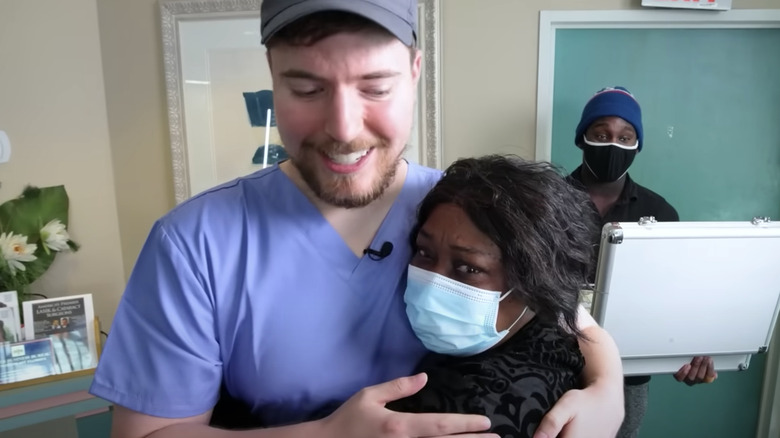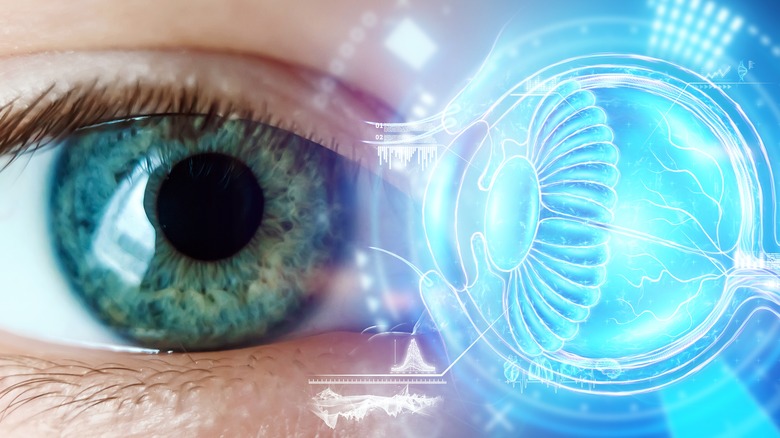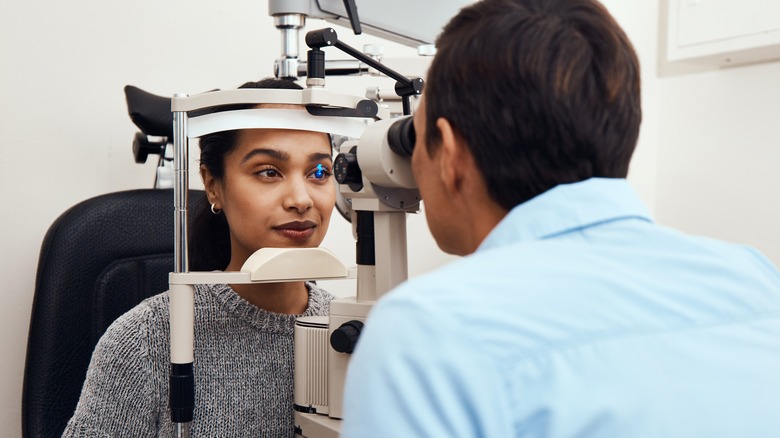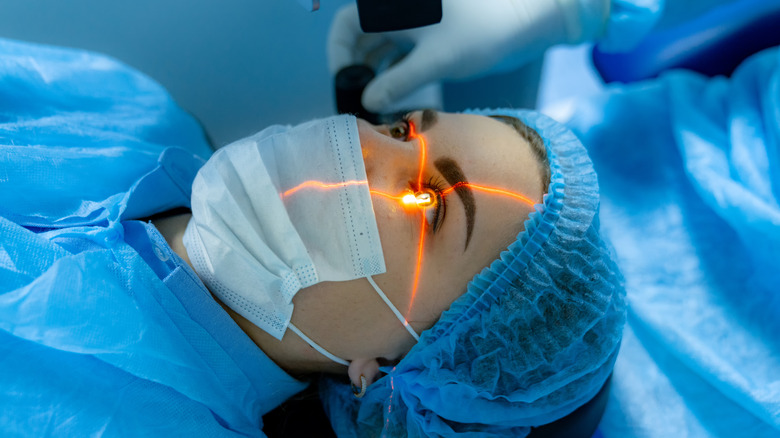MrBeast Is Jumping Into The Healthcare Game By Funding This Costly Procedure
YouTube star MrBeast just made it easier for 1,000 people to see. He went around the world in three weeks to help fund cataract surgeries for people who couldn't afford the procedure (via CNN). The YouTube video shows how difficult life can be for people with cataracts. One man describes how he couldn't do his job, and another man yearned to see his son's face. MrBeast then shows the patients' reactions of shock and joy after the procedure. He also gifts several of the patients $10,000 cash in a silver briefcase. He gives $50,000 to a young man to help pay for college, and he presents the keys to a Tesla to another. The video has already garnered 60 million views.
MrBeast, also known as Jimmy Donaldson, connected with Florida-based ophthalmologist Jeff Levenson back in September 2022. MrBeast said he was inspired by Levenson's TED Talk about the need to help restore the sight of people around the world (via Vision Is Priceless). They called homeless shelters in the Jacksonville area, where Levenson himself performed 40 of the surgeries. Levenson then connected MrBeast with SEE International to find the other 960 patients.
How doctors around the world are helping people see
Levenson is passionate about vision care, to say the least. His Gift of Sight program provides free cataract surgeries for uninsured, low-income people living in Northeast Florida (via Vision Is Priceless). Since 1995, Levenson has performed more than 500 surgeries and provides vision screenings for both children and adults. The program also offers prescription glasses and specialty eye care to prevent future vision problems.
Levenson is also the chief medical officer of SEE International, which provides free eye care for people around the world. The organization was founded in 1974 and has performed 650,000 surgeries. Its global reach is vast and has served more than 5 million patients in 44 countries and trained more than 950 eye specialists to perform manual small incision cataract surgery. This quick, self-sealing procedure allows people in low and middle-income countries to access cataract surgery for a low cost. SEE International offers 150 courses to help eye care professionals serve underprivileged communities.
What are cataracts?
Cataracts are clumps that form when proteins in the lens of the eye break down, according to the National Eye Institute. These clumps make your vision cloudy because they block the eye's ability to focus light effectively. Untreated, these clumps can get bigger and thicker with time, causing colors to become less vibrant and more muted. You also might start to see double, have difficulty seeing at night, and lights might seem too bright or have a halo around them. Additionally, the resulting haziness and blurriness can impede daily life, making essential tasks difficult or impossible. Eventually, total vision loss may occur.
Cataracts are more common among older people, with half of people at age 80 either having cataracts or needing corrective surgery. Your risk of cataracts increases if you smoke, have diabetes, drink excess alcohol, or take steroids for arthritis or allergies. You could also have cataracts if you spend too much time in the sun. Thus, you can prevent cataracts by wearing sunglasses and a hat when you're outdoors. If you play sports or participate in activities that might injure your eyes, be sure to wear protective eyewear. You should also quit smoking and eat a healthy diet to reduce your risk of cataracts.
What cataract surgery entails
According to WebMD, if you experience double vision, poor night vision, or light sensitivity, it might be time for cataract surgery. A few weeks before your surgery, your doctor will measure your eye to find the right size for an artificial lens. Although it's an outpatient surgery and you'll more than likely be awake during the procedure, you might be asked to refrain from eating or drinking 12 hours before.
Your eye doctor will numb your eye, and you might receive medication to help you relax. The doctor uses a laser to make a small incision in your eye, and a tool will remove the cataracts. You'll then get a replacement lens in your eye, and the doctor will close the incision. The whole process is likely to take less than an hour and you'll need to arrange for someone to drive you home.
After the surgery, specialized eye drops recommended by your doctor will help prevent infection. Your eye will be sensitive to light and may be sore for a few days. You shouldn't drive or pick up heavy things after cataract surgery. After about eight weeks, your eye should be healed.




